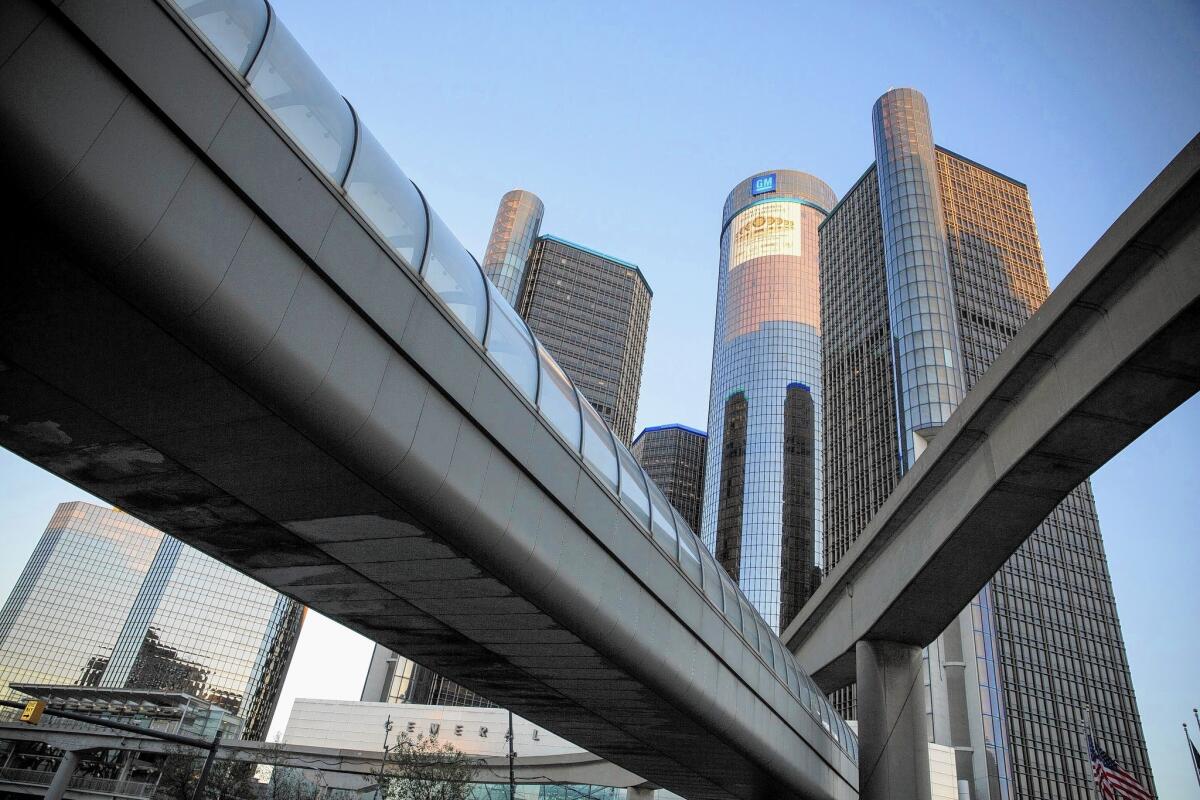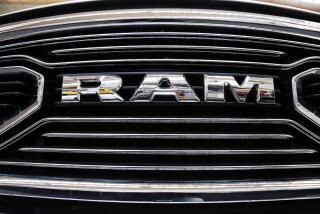GM liability in fatal crash faces key test

- Share via
Margie Beskau would seem to have a strong lawsuit against General Motors for millions in damages.
Eight years ago, her 15-year-old daughter, Amy Rademaker, died in a Chevrolet Cobalt — one of the cars the automaker has now admitted had a deadly safety defect. A faulty ignition switch shut off the car, leaving its teenage driver without power steering, brakes or air bags.
But Beskau probably will never collect in the civil courts, legal experts say, because GM has been absolved of all responsibility for crashes before the automaker’s 2009 bankruptcy and federal bailout. That’s despite the automaker’s public apologies and its recall of 1.6 million vehicles to fix ignition switches.
GM has acknowledged 12 deaths were caused by the problem. But the Center for Auto Safety, an advocacy group, estimates that number could be more than 300. More than half of those wrecks occurred before GM’s bankruptcy, according to an analysis the center performed at The Times’ request.
“They should be liable for Amy’s death,” Beskau said. “They lied to everybody; they covered up the problem. They put anybody who bought the car or who — like my daughter — rode in the car, at risk.”
The automaker confirmed that the post-bankruptcy GM bears no liability for accidents before its legal reinvention. Bankruptcy and product liability experts agree.
As in many corporate bankruptcies, GM’s legal slate was wiped clean. The restructuring technically created a new company of the same name, which bought the assets of the old GM — but allowed it to shed its debts and legal liabilities. The U.S. government brokered the transaction as part of a historic bailout to save the company from collapse.
“GM completely threw all product liability claimants under the bus,” said Steve Jakubowski, a Chicago bankruptcy attorney.
The bailout ultimately cost taxpayers $10.5 billion.
The question of liability hangs on a specific date: June 1, 2009, the day GM filed for bankruptcy. GM is off the hook for lawsuits based on crashes before that date, said Harvey Miller, a partner in the New York law firm of Weil, Gotshal & Manges that guided GM through its 2009 bankruptcy. The automaker could face millions of dollars in civil judgments involving crashes after that date.
The crash that killed Beskau’s daughter and another teen, Natasha Weigel, took place on a Wisconsin road in 2006. The ignition switch in a 2005 Chevy Cobalt driven by 17-year-old Megan Phillips slipped out of the “on” position, shutting off the power steering, power brakes and air bags. Phillips lost control of the car, striking a telephone junction box and two trees. The air bags failed. The passengers were killed and Phillips suffered lasting injuries.
Margie Beskau suspected a problem with the car at the time. Only recently — as GM recalled cars over the last six weeks and issued multiple apologies — did Beskau and the families of the other victims in the accident become aware that GM knew of the problem and had failed to fix it. The switches can fail because of heavy key chains, or if a driver inadvertently bumps the keys and ignition.
The families filed a wrongful-death and injury suit against the automaker last week, after learning about multiple federal investigations into GM’s actions — and documents showing the automaker knew about the ignition switch problem before the bankruptcy. But it hinges on convincing the original bankruptcy judge that the company defrauded the court by withholding information about the safety defect.
The case is a long shot, attorneys said.
“They just won’t do it,” said Jakubowski, the Chicago bankruptcy attorney. “I can’t fathom a bankruptcy court now saying it would have any interest in revisiting the judgment to alter it or revoke it.”
Rudy Gonzales, one of the attorneys representing the families, expects a battle but said families should still file against GM.
“There is no question that this is going to be a legal fight unless General Motors does what it should do,” Gonzales said, noting the company’s public admissions that it failed to resolve a serious safety issue.
There’s another way to force GM to pay the claims, said Sen. Richard Blumenthal (D-Conn.). The federal government should pursue criminal charges against GM, he said.
Last week, Toyota Motor Corp. agreed to a Department of Justice settlement in which it admitted delaying recalls and misleading consumers, regulators and Congress about problems with sudden acceleration in its vehicles. The automaker paid a $1.2-billion fine to avoid further prosecution.
“Bankruptcy provides no immunity from criminal prosecution,” Blumenthal said. “The Department of Justice has enormous leverage to require the establishment of a fund for compensating victims, just as it did with Toyota.”
The U.S. government, he said, has a moral responsibility to hold GM accountable because it helped the company avoid liability through bankruptcy.
It’s not clear how much money GM might have to pay out if it picks up the claims for deaths and injuries before its bankruptcy.
The study estimating that the ignition problem may have caused more than 300 deaths was commissioned by the Center for Auto Safety. The number is a count of people who died in affected cars while riding in the front or passengers seats during crashes in which air bags failed.
The study could not determine that all of those accidents resulted from the ignition failure, and it examined just two of the six models that GM has recalled for ignition switch problems.
GM has disputed the numbers.
“Without rigorous analysis, it is pure speculation to attempt to draw any meaningful conclusions,” the automaker said in a statement.
Based on damage payments from other auto industry wrongful-death awards and settlements, more than $100 million in death claims could have been wiped out by the GM bankruptcy, said Clarence Ditlow, executive director for the Center for Auto Safety. That doesn’t include injury claims.
“That’s why we have asked GM to put $1 billion in a trust fund,” Ditlow said. “It needs to be adequate to cover all the victims, and at this point we don’t know how many victims there are and what situation they are in.”
Beskau is hoping that GM chooses to take responsibility for her daughter’s death.
“It has left a huge hole in the family,” the Woodville, Wis., mother said. “She was high energy, and she made people laugh. The house got very quiet when she left.”
Times staff writer David Undercoffler contributed to this report.
when she left.”
Times staff writer David Undercoffler contributed to this report.







